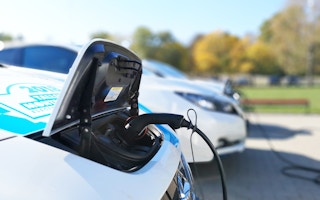With Singapore’s electric vehicle (EV) charging scene getting more crowded, the newest entrant to the market has come up with an offer to entice private condominium and commercial and industrial building owners.
Clean energy developer Urban Renewables will install EV charging units for free for customers that sign up for its rooftop solar and energy efficiency services.
The initiative, under its newly launched brand Urban Charge, is the first of its kind in Singapore that bundles EV charging infrastructure and other green energy technologies. Government efforts have been focused on public carparks, and Urban Renewables sees a “crucial need to support the installation of EV charging units at corporate and private levels”, said Edgare Kerkwijk, managing director at Urban Renewables.
Office buildings, shopping malls and other private estates where urbanites spend much of their time, with their vehicles parked out front or in underground car parks, have been relatively neglected, he said.
Urban Renewables’ bundled deal seeks to address the chicken-and-egg challenge facing Singapore on its green mobility journey: The nation’s sparse charging infrastructure has been cited as a major barrier to the switch to EVs. But without greater EV uptake, investors remain reluctant to put more money into charging points. Experts say strategically distributing charging stations and making them easily accessible is key to driving EV adoption in Singapore.
“
Nobody is going to buy an EV if they can’t charge it. To decarbonise its transport sector, Singapore will need to roll out charging stations much faster than it currently does.
Edgare Kerkwijk, managing director, Urban Renewables
“Nobody is going to buy an EV if they can’t charge it,” said Kerkwijk. “To decarbonise its transport sector, Singapore will need to roll out charging stations much faster than it currently does.”
Competition has been heating up in the race to grow Singapore’s charging network. Several companies including Shell’s EV charging service provider Greenlots, electric car sharing service firm BlueSG, energy provider SP Group, and solar firm Sunseap’s new EV charging subsidiary Charge+ are set to install thousands of charging points to help Singapore meet its goal of phasing out fossil fuel vehicles by 2040. Even American carmaker Tesla is said to be keen.
Singapore plans to boost the number of EV charging points to 28,000 at public carparks islandwide by the end of this decade, up from 1,700 today. But the country’s transport minister said last October that the target may be insufficient to deal with the anticipated growth of EVs, pointing to the need to rope in commercial entities. By 2030, battery-powered cars are projected to form one-third of Singapore’s car population.
But as of last month, there were only 1,217 fully electric vehicles in Singapore. That charging stations on private premises may be rarely used for years and earn investors little in returns is a legitimate concern that has deterred condominiums and commercial buildings from adopting them.
Which is why Urban Renewables will absorb all the risk involved, putting in place charging points for free for companies and estate owners for whom it installs rooftop solar facilities or retrofits buildings with more efficient air conditioning and smarter management systems. The firm takes full responsibility for maintenance and will split the revenue generated with clients.
Kerkwijk told Eco-Business that building owners across Singapore have already signalled their interest in the packaged deal, especially with electricity prices on the rise. In the coming years, the company also plans to take advantage of opportunities in Malaysia and beyond.
Sanjay Chittarajan Kuttan, executive director at Singapore Maritime Institute and chairman of the sustainable infrastructure committee at Sustainable Energy Association of Singapore (SEAS), said such bundled packages have the potential to accelerate Singapore’s clean energy shift.
“The fact that Urban Renewables bundles solar energy and EV charging stations pushes the argument for transport electrification, because one of the pushbacks has been that gas-based rather than renewable electricity is used to charge EVs in Singapore,” he said.
Bundling EV charging infrastructure with solar and energy efficiency projects could also work well in other cities in the region, he said. For instance, it could help in the rollout of electric motorcycles in cities in Vietnam, Thailand, Indonesia, and the Philippines.
While Singapore cannot mandate commercial buildings to build charging ports, the city-state promotes the adoption of charging stations in private carparks through its BCA Green Mark Scheme, which awards buildings points for improved environmental performance. Kuttan noted the scheme could be enhanced to incentivise estate owners to combine charging infrastructure and rooftop solar.
Going forward, integrated solar charging solutions may also help to fully integrate EVs into energy systems, harnessing them as a grid resource to better handle intermittent solar power output, Kuttan told Eco-Business.
Such vehicle-to-grid schemes could enable EV owners to replenish their batteries at work or while shopping, and sell surplus green power back to the grid at night. But Singapore has yet to implement the policies needed for such a scheme to work, including a differentiated pricing mechanism that pays preferential rates for electricity fed back into the system to get customers on board.
Beyond pledges to ramp up charging infrastructure, Singapore dangles various carrots to drive EV uptake and discourage spending on more pollutive models. Its Electric Vehicle Early Adoption Incentive (EEAI) coupled with the enhanced Vehicular Emissions Scheme (VES) offers buyers combined cost savings of up to S$45,000 when they purchase a fully electric car, narrowing the upfront cost gap between battery-powered automobiles and their fossil fuel equivalents.
What is also needed in the clean mobility transition, is a change in mindset, said Kuttan. “How much do you want the government to do? Some people simply seem to like the sound of engines and the smell of petrol.”

















